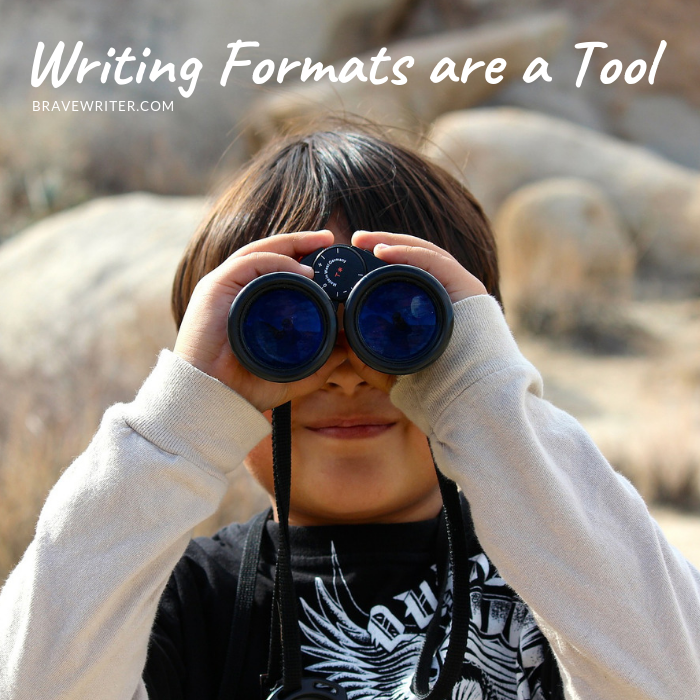Do You Ever Teach Writing Formats to Young Children?
The process of learning writing formats is very similar to how we learn to speak.
One of our BW moms asked me this week about teaching formats to her daughter who is now comfortable with writing. Does the Brave Writer philosophy eschew with formats all together? Is there ever a time to identify a topic sentence, to explain a descriptive paragraph, to teach the difference between argumentative and narrative paragraphs?
The answer is most assuredly, “Yes.”
Writing involves the use of formats as surely as speech does. We often follow unconscious formats as we speak. We greet each other according to conventions we learn along the way, we answer the phone and give directions according to formats we’ve internalized after years of talking and emulating other speakers. Eventually, some of us make an effort to learn how to give a speech or business presentation. We are trained to make a sales pitch or to close a deal.
All of these speech formats come long after we’ve internalized speaking as a primary means of communication.
With writing, it works the same way. As your child shows confidence and competence in freewriting, revision and editing, it is perfectly fine to discuss writing formats and to even “give them a whirl.” Most formats can be found on the Internet (descriptive, narrative, expository and argumentative paragraph instructions proliferate).
The tendency (for unconfident parents and not quite convinced writers) is to forget about writer’s voice, freedom, saying something that is meaningful rather than regurgitating what is expected, when faced with formats. My advice is to see formats as a new tool to help shape your child’s original quirky self into a recognizable format.
“Writing formats are a tool to help shape your child’s original quirky self into a recognizable format.”
In other words, if you are writing a poem, rhyme is a common feature of poetry. Putting your thoughts into meter and end rhyme is part of the fun of that writing style. Likewise, if the writer’s topic lends itself to description, then focus on sensory observations and organize the writing around a journey through the senses rather than falling into the temptation to narrate an event or to explain how to peel an orange (rather than describing it). A descriptive paragraph is a paragraph whose focus is description… that means that it needs to show me, rather than tell me.
A format in writing acts as a kind of container for the original thoughts and metaphors that the writer brings to the topic. My suggestion for brave writers, then, is that freewriting, exercises like the keen observation or musical language assignments ought to precede the attempt to write to a format. Get lots of ideas, images, words, thoughts out onto the page before imposing a format. Then, take the format and see how the ideas your writer has put forth can be organized to suit a specific format. Rearrange, embellish, adapt and shuffle until the writing is both an expression of a person and fits into the desired format.
Tags: writing formats



















